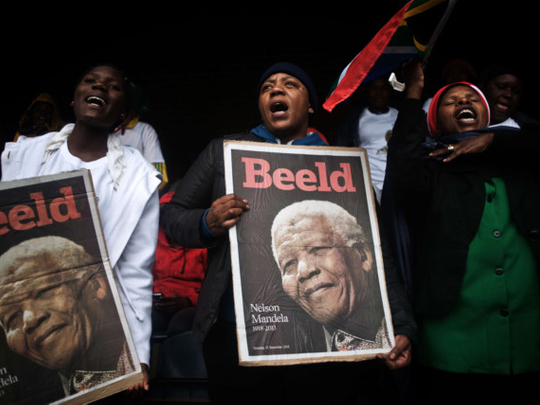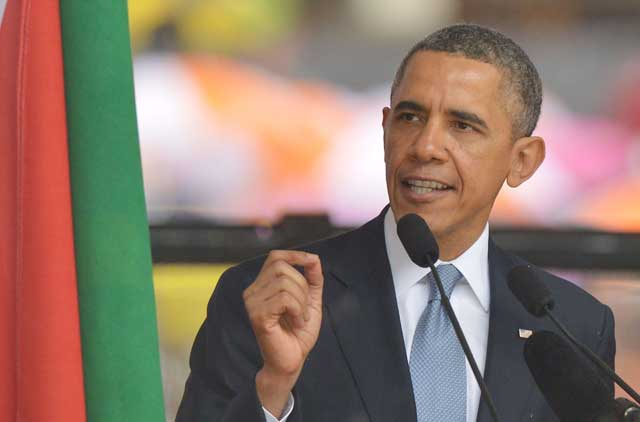
Johannesburg: In February 1990, South Africans gathered at FNB Stadium in Johannesburg, to hear Nelson Mandela address the nation as a free man after his long years in prison.
In July 2010, the world saw his familiar smiling face — one more time — during the closing ceremony of the soccer world cup at the same stadium.
On Tuesday, December 10 2013, South Africans and world leaders again gathered at the stadium — this time to say goodbye.
Rain is often considered a blessing and it poured steadily in Johannesburg, during the national memorial service for Nelson Mandela. The weather and security arrangements kept the number of people attending the service in check, but those in the stadium kept the atmosphere lively with the freedom songs that are a part of every gathering where his life has been celebrated. Cyril Ramaphosa, deputy president of the ruling African National Congress, regularly had to call for the singing to be toned down, so that the speakers can be heard, as the crowd grew increasingly restless as the day wore on. Many started leaving the proceedings early.
While the eulogies and prayers at the service repeatedly praised a man revered as an international icon, others who were close to him in government and prison, have been regaling people with stories of someone who was all too human — both as a leader and an ordinary man. As much as he was a peacemaker, he was a militant revolutionary; as much as he was a reconciler, he could be a calculating politician.
US President Barack Obama put it best in a call to action for a better world, when he invoked Mandela to get individuals to take personal responsibility for ensuring peace and freedom across the globe.
“Madiba’s passing is rightly a time of mourning and a time to celebrate his heroic life. But I believe it should also prompt in each of us a time of self-reflection. With honesty, regardless of our station or circumstances, we must ask: ‘How well have I applied his lessons to my own life?’ It is a question I ask myself as a man and a president.”
Perhaps speaking as much to his fellow world leaders on the stage behind him, as to the cheering crowd in front, he went on: “Around the world today, we still see children suffering from hunger, and disease; rundown schools, and few prospects for the future. Around the world today, men and women are still imprisoned for their political beliefs; and are still persecuted for what they look like, or how they worship, or who they love.
“There are too many of us who happily embrace Madiba’s legacy of racial reconciliation, but passionately resist even modest reforms that would challenge chronic poverty and growing inequality. There are too many leaders who claim solidarity with Madiba’s struggle for freedom, but do not tolerate dissent from their own people. And there are too many of us who stand on the sidelines, comfortable in complacency or cynicism when our voices must be heard.”
Obama went on: “Nelson Mandela reminds us that it always seems impossible until it is done. South Africa shows us that is true. South Africa shows us we can change. We can choose to live in a world defined not by our differences, but by our common hopes ... by peace and justice and opportunity.
It was a speech worthy of the memory of a world icon of peace, but it might be met with some cynicism in those countries where Obama’s rhetoric is perceived to not always been backed by deed.
However, before his speech, Obama made his way through the gallery of over 90 world leaders in attendance, greeting many of them and shaking hands with the president of Cuba, Raul Castro. The US and Cuba, cold war enemies, are still at loggerheads although their relations have improved marginally of late.
Castro was one of the few other heads of state who addressed the memorial service. Cuba was an ardent military and political supporter of the South African liberation movement and even today ties between the two countries run very deep. Raul quoted his brother, the former president, Fidel Castro, who said: “Nelson Mandela will go down in history because he was capable of cleaning his soul of poison.”
Obama was followed by the president of India, Pranab Mukherjee.
The start of his speech was interrupted by singing from a section of the crowd. He said that to India, Mandela was a visionary who epitomised an uncommon humanness.
Mukherjee added that Mandela continued his non-violent struggle with dignity and pride and he reminded Indians of Mahatma Gandhi.
By the time South African president, Jacob Zuma, addressed the crowd in a speech that fell short of expectations. It was a lengthy repetition of Mandela and South Africa’s political achievements.
Worryingly for the ruling ANC, Zuma — whose government is caught up in corruption scandals and who is perceived to fall far short of Mandela’s moral authority — was repeatedly booed during the day’s proceedings. The ANC faces a hard-fought election next year and is riven with divisions.
However, Zuma echoed a popular sentiment when he said: “South Africans sing a popular freedom song about Mandela: that he is one of a kind, that there is no one quite like him. It is one of the most accurate descriptions of this global icon. Everyone has had a Mandela moment, when this world icon has touched their lives.”
It was left to Archbishop Desmond Tutu to achieve the real purpose of the day. Giving the final blessing in some of South Africa’s different languages he made the country promise — before God — to uphold the values of its greatest son, Nelson Mandela.
— Paul Stober is a senior journalist in South Africa













